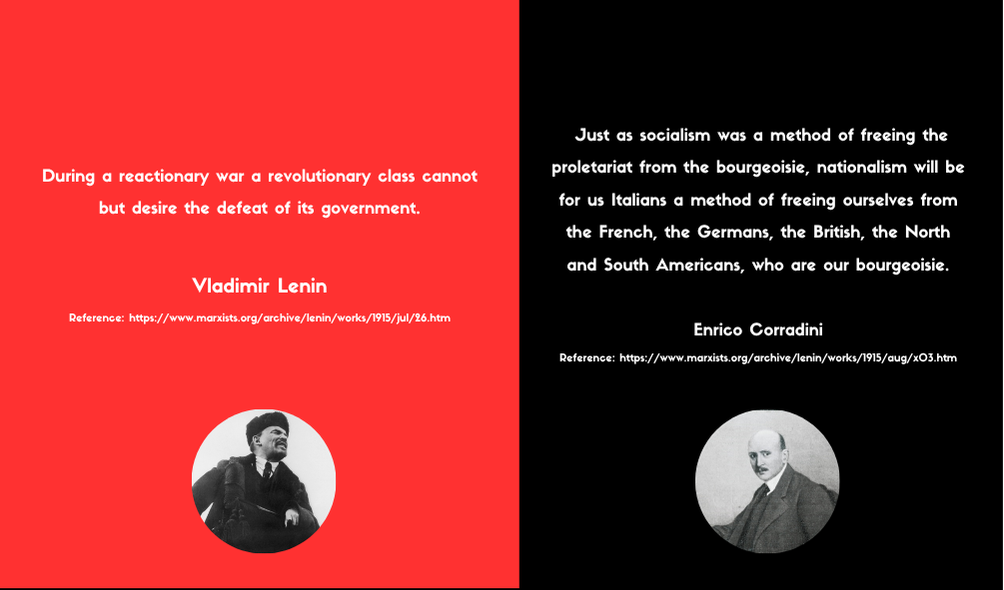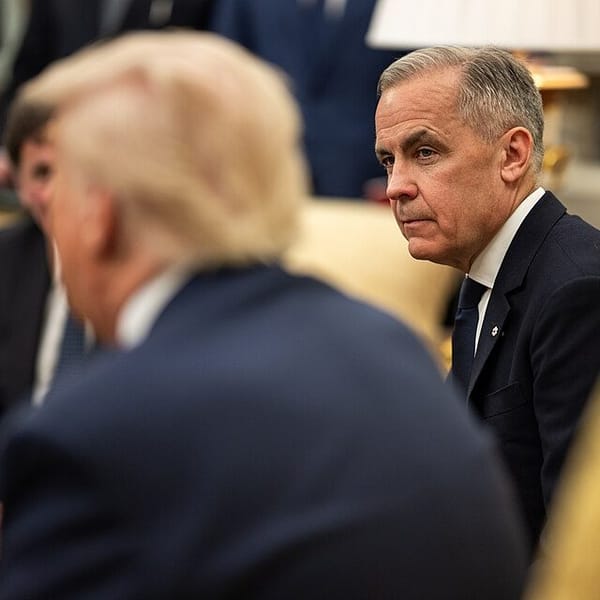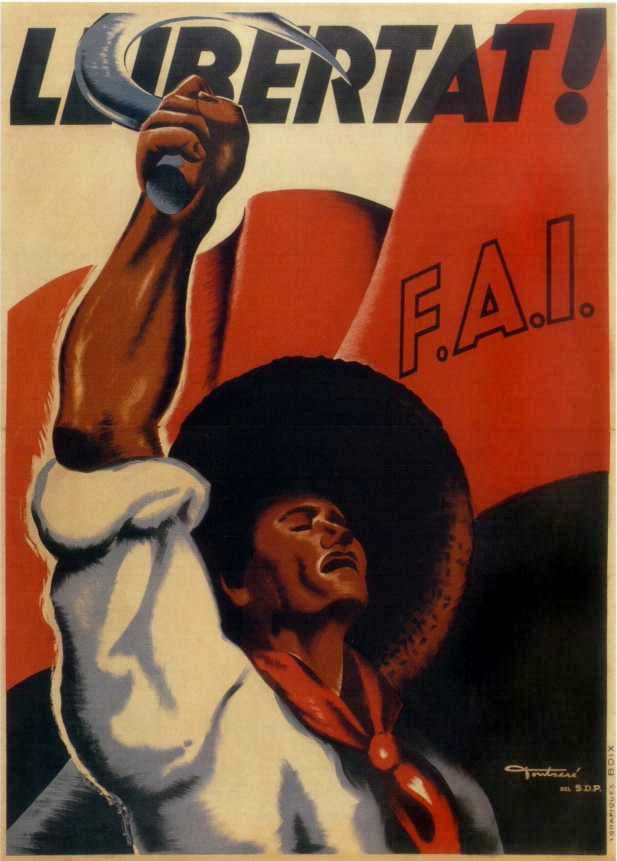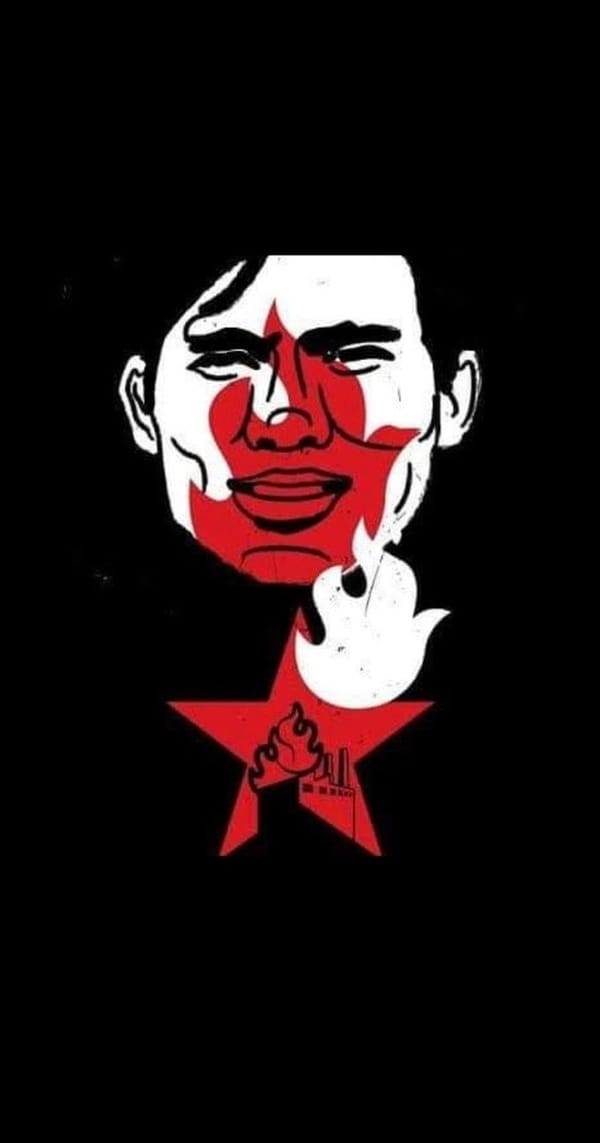Anti-imperialism of the Idiots: How Campism Mirrors the Fascist Geopolitics

Historically, social change was fuelled by widespread distress—poverty, class oppression, and economic disparity—leading to peasant revolts. These revolts typically focused on immediate local targets, such as high taxes and exorbitant interest from landlords, but were inherently limited in scope and lacked a comprehensive revolutionary plan to end oppression universally. This limited, regional approach changed in nineteenth-century Europe with the rise of industrial capitalism. It was here that Internationalism first appeared as a global, systematic movement, offering a theoretical solution—the socialist economy—and advocating for the political self-determination of all peoples as a genuine path to ending the suffering of the oppressed.
The term imperialism, derived from the Latin word imperium meaning "government," historically described ancient empires like Rome that shared characteristics such as military conquest, political subjugation, and economic exploitation. Modern empires—initially led by powers like Spain, France, and England—were transformed by industrial capitalism in the nineteenth century into competitive Great Powers, joined later by countries including Germany, Japan, and the United States, all vying for global domination. Due to the material conditions of imperialist empires emerging, revolutionaries of the time, ranging from mutualists to communists, discussed how to respond to imperialism. “The Anti-Imperialist League” movement from 1898 where figures like Mark Twain were involved could be the first revolutionary movement against the imperialism by arguing that imperialism violated the core American republican value of "consent of the governed. Later in 1910s, Karl Kautsky, the leading Marxist of the orthodox Marxism of the Second International, argued the concept of ultra-imperialism where the major imperial powers might cooperate and cartelize to jointly exploit the world, thereby eliminating inter-imperialist wars.
Anti-imperialism of Lenin
However, Lenin, arguably a revolutionary Marxist who founded a new form of Marxist school called Leninism popularised the struggle against anti-imperialism with his book with thoughtful analysis, 'Imperialism: The Highest Stage of Capitalism' by arguing that the uneven development of capitalism made sustained, peaceful cooperation impossible and that rivalry and war were inevitable. Lenin argued that imperialism, driven by concentrated high finance, extended capitalism's life by exporting capital to colonies, which counteracted the tendency for falling profits caused by the increasing organic composition of capital. For Lenin, imperialism is the point in history where free competition in capitalism ends, and the economy becomes controlled by a few giants, monopolistic corporations and financial institutions.
Lenin’s analysis, which identified World Wars I and II as conflicts driven by imperialist rivalries, proved prescient, distinguishing his view from the mainstream social democratic parties of the Second International who supported their national governments. He categorized those who opposed the war as "internationalists" and those who supported it as "defencists." Central to Lenin's strategy was the concept of the "labour aristocracy," a small group of workers in core imperialist nations placated with higher wages from colonial profits, which rendered them politically complacent. Because of this complacency, Lenin identified the periphery—the intensely exploited workers and national liberation movements in the less-developed nations—as the "weakest link" in global capitalism. Consequently, he advocated for a strategic alliance between the revolutionary proletariat of the advanced nations and these colonial liberation movements to break the capitalist chain and advance international revolution. According to Lenin, anti-imperialism was a revolutionary strategy, not an ultimate goal, aimed at triggering the collapse of global capitalism by cutting off its economic lifeline. He theorized that successful revolts in exploited nations would deprive imperialist powers of vital profits, causing economic crises that would then spur revolutions in the wealthy and imperialist countries.
Anti-imperialism of fascists (The concept of Proletarian Nation)
Proletarian Nation is a concept developed by Italian nationalist thinker named Enrico Corradini. Unlike Lenin, his theory of anti-imperialism doesn’t advocate the class struggle to dismantle the whole global capitalist system which would also bring down imperialism. Instead, he believed that the class struggle could be replaced by a struggle between nations, specifically between "proletarian nations" and “plutocratic/imperialist nations”. Corradini redefined the concept of the proletariat, claiming that Italy was a "proletarian nation" being oppressed and exploited by wealthy, "bourgeois" nations like France, Germany, and Britain. Corradini advocated for the proletarian nations (the oppressed nations) to try becoming more prosperous nations by practising class collaboration through guild socialism via the means of syndicates as someone who admired nationalistic and anti-capitalist proletarian movements such as national syndicalism against the internationalist syndicalism or international socialism. He argued that just as socialism was the tool for the working class to free itself from its domestic capitalist oppressors, nationalism was the necessary tool for Italy to achieve freedom from this international imperialism. Therefore, Corradini concluded, all Italians should abandon class struggle and adopt nationalism as their form of "socialism" to unite and secure Italy's national and imperial interests on the world stage.
Mussolini co-opted this geopolitical theory, defining it as a national syndicalist ideology that elevated labour as a source of national pride and nobility. This appeal stemmed from a syndicalist belief, rooted in Sorel's theory of "producerism," which stated that genuine social revolution and meaningful change depended entirely on achieving "superior productivity" and economic abundance. Observing the economic failures in early Soviet Russia (like high unemployment after the Civil War), many Italian fascist syndicalists concluded that Italy's economically "primitive" condition could not support a successful social revolution without a developed industry. Consequently, they abandoned orthodox Marxism and embraced Fascism. According to Mussolini and other syndicalist theoreticians such as Edmondo Rossoni, Fascism would be the socialism of proletarian nations. Likewise, Ikki Kita, recognized as the originator of Japanese fascism, advocated for Japan's territorial expansion into Korea and Manchuria. He also endorsed military conflict with both the Soviet Union and Britain, labelling them as "landlord nations" in contrast to Japan, which he characterized as a "proletarian nation."
Corradini's theory of the "proletarian nation"—which framed entire countries as exploited classes—significantly influenced later political thought, crossing ideological lines from Italian Fascism to Chinese Communism. Key CCP founder Li Dazhao and Mao Zedong's "New Democracy" both utilized this concept by prioritizing national class collaboration (similar to Mussolini's state-corporatism) to strengthen China against foreign imperialism. Moreover, Mao's Three Worlds Theory, which emphasized geopolitical struggle between nations (First, Second, and Third Worlds) rather than pure class struggle, echoed Corradini's framework. Furthermore, several Marxist-Leninist (Stalinist) groups such as American Workers Organization (M-L) and Revolutionary Union, can be seen using the same term “proletarian nation” in similar meanings as well.
Anti-imperialism of Stalinists: The Accidental Fascism
The Soviet bureaucracy functioned as a new ruling class that controlled the means of production, using the planned economy not for the people's benefit, but as a mechanism for siphoning off surplus value in a form of state capitalism. This system maintained the fundamental class struggle that characterizes all capitalism as the state through the vanguard party is taking the surplus value taking the role of bourgeoise class, despite the USSR's socialist claims. Compounding this, the failure of international revolution forced Stalinism to abandon Leninist internationalism, leading the state to adopt state-corporatist policies and the concept of the Proletarian Nation to ensure national survival. This resulted in the USSR rejecting class struggle in practice and using socialist rhetoric to establish a "sub-imperialist camp" of satellite states, thereby transforming ideological conflict into geopolitical rivalry. In reality, Stalinism was a form of state capitalism that adopted state-corporatist policies and practiced social imperialism under the banner of defending "Proletarian Nations" or “oppressed nations”, despite parroting internationalist and socialist claims. Consequently, the Soviet Union, while socialist in name, functioned as an "accidental fascist" state due to its actual economic and political practices.
Third Campism: anti-imperialism of the internationalists
Unlike Stalinist sub-imperialist Campism, the central tenet of "Third Camp" socialism is the absolute necessity of independent working-class politics, maintaining independence from one's own ruling class and its foreign enemies, encapsulated by Karl Liebknecht’s dictum: "The main enemy is at home." This strategy required opposing the entire global system of imperialism—including both bourgeois democracies and totalitarian states like Stalin's USSR and Hitler's Fascist regimes—because siding with any imperialist bloc would betray the ultimate goal of overthrowing the system as a whole. While acknowledging differences between antagonistic systems, the theoreticians of third Campism such as Max Shachtman, Hal Draper, Tony Cliff and CLR James refused to pick a "lesser evil" because they believed the only way to end imperialist oppression worldwide was through the unified action of the international working class, whose political independence was non-negotiable. Third Campism, emerging from the post-Trotskyist tradition, represented a revival of authentic Leninist anti-imperialism.
Campism: Anti-imperialism of the tankies
The term “anti-imperialism of the Idiots” or “anti-imperialism of the fools” is not a new phenonium. Ferdinand Kronawetter, an Austrian left-liberal politician, used the term “antisemitism is the socialism of fools” against those who suffer economic antisemitism in the name of anti-capitalism, and the term later was re-used by Karl Marx and Marxists like August Bebel. Several internationalist socialists such as George Orwell and Moishe Postone have criticised leftist sympathies of authoritarianism in the context of Stalinist tyranny (and post-Stalinist nostalgia). The term ‘Tankie’ is used to describe authoritarians British Marxist-Leninists who stood by the official party line and supported the USSR tanks sent to crush the Hungarian Revolution. Recently, new term “anti-imperialism of the Idiots” had been introduced by Leila Al-Shami, a Syrian anarchist. Similarly, a Sri Lankan feminist named Rohini Hensman called it ‘pseudo-anti-imperialism‘.
Unlike a genuine anti-imperialist stance, which consistently opposes all instances of imperialism regardless of the actor, this 'campist' viewpoint simply chooses sides. This approach effectively leads to supporting supposedly the vanguards of the proletarian nations like Russia or China under the misguided justification of merely "opposing the West." Many Western leftists who claim to have opposed western’s imperialism and their ‘war on terror’ discourse often refused to condemn Bashar al-Assad's regime and other Baathist regimes for their crimes against humanity towards Kurdish people, Armenian people, Jewish people, and Syrian people because most of the Baathist regimes were the opponents of the U.S and a proponent of Russia. Certain influential Marxist-Leninists, such as Vijay Prashad, demonstrate a selective application of their anti-imperialist principles: they refuse to accept reports of atrocities (like the genocide against the Uighur Muslims in China) when the alleged perpetrator is an antagonist of the West. Conversely, when criticizing crimes affiliated with the United States or Western powers, these same figures are willing to form highly contradictory alliances, even collaborating with far-right figures such as Geroge Galloway supporting Nigel Farage's Brexit Party, showing their commitment is to anti-Western alignment rather than consistent human rights or independent class politics.
Today's Marxist-Leninists and broader western left have shifted away from genuine anti-imperialism—whether based on Leninist principles or the "Third Camp" ideal—to become mere "sub-imperialist cheerleaders." This ideological degeneration mirrors Enrico Corradini's concept of the "proletarian nation" by prioritizing national rivalry over class struggle, leading them to praise and support authoritarian states like Baathist regimes, Myanmar military regimes, and current governments in Russia and China. This behaviour mirrors how figures like Enrico Corradini, Mussolini, and Edmondo Rossoni championed national syndicalism to transform Italy into an imperialist state.
Anti-Imperialism as a Querfront Strategy: The Synthesis of Far-Left and Far-Right
Aleksandr Dugin, a co-founder of National Bolshevik Party who is the theoretician of The Fourth Political Theory, that claims to be different from all other ideologies such as liberalism, fascism and communism. He advocates for a "multipolar world" and actively stays against Enlightenment ideas just like the philosophers from the “Conservative Revolution” tradition such as Julius Evola, Carl Schmitt, and Martin Heidegger. Similar to Enrico Corradini's concept of the "proletarian nation", Aleksandr Dugin in his book “Foundations of Geopolitics” urged Russia to restore its global power by forging alliances and engaging in conquest. The ultimate goal of this strategy was to directly challenge the rival "Atlanticist" empire, which he claimed was led by the United States. Besides, the concept of establishing a "union of the Right and the Left" to create a unified anti-liberal movement, as advocated by Aleksandr Dugin, draws parallels to the querfront political tactics characteristic of classical Fascism and Nazism.
Aleksandr Dugin can be seen working closely with China’s state sponsored think-tank and their closely affiliated international Marxist-Leninist groups. “Wave Media”, the media outlet of The China Academy, a think tank from China, normally features Aleksandr Dugin for his anti-western geopolitics and normally give platform to Jackson Hinkle from American Communist Party to praise BRICS, a sub-imperialist camp. Despite belonging to movements with Marxist-Leninist or National Bolshevik roots, figures like Aleksandr Dugin and Jackson Hinkle are broadly identified as far-right, illustrating the confusing political boundaries of these contemporary movements. A surprising dynamic is the interconnectedness between these figures and prominent Marxist-Leninists like Vijay Prashad, who has ties to established leftist organizations like the Rosa-Luxemburg-Stiftung and normally appears on the same platform “Wave Media” where people like Aleksandr Dugin, and Jackson Hinkle appears positively as ideological allies. Vijay Prashad also collaborates with influential and respected Marxist-Leninist figures like Taimur Rahman, the Secretary-General of the Mazdoor Kisan Party from Pakistan. This complex web also includes figures like George Galloway (the leader of the Workers Party of Britain) who frequently features Jackson Hinkle to discuss geopolitics that favour the BRICS "sub-imperialist camp." These overlapping affiliations—encompassing Marxist-Leninists, neo-Stalinists, conservative leftists, and MAGA communists—reveal a loosely connected network of the supporters of BRICS imperialist camp. KATEHON, the publication of the Tsargrad Institute directed by Alexander Dugin, functions as a key platform (or hub) for a range of anti-imperialist querfront figures, including George Galloway, Vijay Prashad, Jackson Hinkle, Errol Musk, Alex Jones, Jeffrey Sachs, and Sahra Wagenknecht.
These networks appear to be united by a shared anti-Western alignment and is often amplified through state-affiliated think tanks and their media channels originating from nations like China and Russia. The collaboration between the well-known anarchist Noam Chomsky, who defended the Cambodian genocide, and Vijay Prashad on the U.S. withdrawal from Afghanistan demonstrates that geopolitical Campism often overshadows ideological differences. It is evident that the contemporary self-proclaimed anti-imperialist left has significantly degenerated; their "campist" pseudo-anti-imperialist stance now mirrors the fascist concept of the "proletarian nation," which asserted that oppressed nations must strive for power by becoming sub-imperialist themselves.
Myanmar’s Spring Revolution: The Scapegoat of Campism
Vijay Prashad once examined the 2021 military coup in Myanmar through a political as well as geopolitical lens and insisted the global left to stand in solidarity with the Myanmar’s Spring Revolution. However, the Spring Revolution in Myanmar has become a battleground for competing imperialist interests, with the ruling military junta capitalizing on its isolation to forge deeper ties with Russia and China. Russia, globally isolated, has become a key military supplier and diplomatic partner, conducting joint naval exercises and supporting the junta's bid for BRICS observer status, which would help shield the regime from Western sanctions. The junta further solidified its non-Western alignment by being admitted as a "Dialogue Partner" of the Shanghai Cooperation Organisation (SCO) in May 2023, a security bloc led by China and Russia, which offers crucial insulation from sanctions. All these powers—Russia, China, and their allies—are now endorsing the junta's plan for a sham election in late 2025, providing the military regime with crucial diplomatic legitimacy against the wishes of Myanmar's resistance and population.
The state news agencies from Russia and China are featuring pro-junta and anti-opposition position articles by asserting that the whole Myanmar Spring revolution is a colour revolution. The Russian state news agency, RIA Novosti, justified the coup in Myanmar by asserting that the military, the Tatmadaw, is the sole force capable of guaranteeing the country's multi-ethnic unity and peace. The Chinese Communist Party-backed newspaper, Global Times, issued a warning to the US and Western powers to refrain from encouraging civil war in Myanmar. Beyond the state news agencies, there are certain Marxist-Leninist groups and parties who are parroting the same narratives. The Communist Party of Great Britain (Marxist-Leninist) asserts that Myanmar enjoys a strong alliance with China and plays a vital role in the Belt and Road Initiative. They claim that each link in this trade network has faced aggressive interference from the United States and the western imperialism, ranging from violent assaults on construction personnel to efforts aimed at overthrowing governments involved in the project. Also, the World Anti-imperialist Platform advocates for the removal of Western sanctions against Myanmar, aligning with the Myanmar military junta's lobbying efforts to achieve the same goal. In the meantime, Myanmar trade union movements and progressives are actively calling invoke Article 33 of the International Labour Organization (ILO) against Myanmar via The International Trade Union Confederation (ITUC). Red Fire, the publication of the Workers League, a socialist organisation from Australia even claimed the whole Spring Revolution as a Western backed “Pro-Democracy” war and the working class who are taking part in Spring Revolution as “terrorist”. KATEHON also portrayed NUG as a western backed exiled government.
However, a split seems to exist within the Marxist-Leninist network, as demonstrated by the Midwestern Marx Institute. This institute republished an article from Michael Christopher, the former secretary of the Virginia District of the Communist Party USA, featuring the People's Liberation Army—the military wing of the Communist Party of Burma—which is actively fighting in the "Spring Revolution" alongside the NUG, the exiled, pro-Western government. Among Marxist-Leninist parties, those typically aligned with the KKE (Communist Party of Greece) and its network appear sympathetic to the revolution in Myanmar. They maintain this stance despite acknowledging the bourgeois nature of the National Unity Government (NUG), the exiled opposition.
Aleksandr Dugin also called Myanmar Spring Revolution a coloured revolution along with other revolutions like Nepal, and so on. In addition, Aleksandr Dugin attended "Forum on Myanmar Beyond 2025: Challenges and Opportunities in the Multipolar World" in March 2025 and attended the Myanmar Peace Forum via Zoom, both of which are hosted by the Myanmar military junta, and he discussed the concepts of Eurasianism, and Multi-polarity. After such events, pro-military dictatorship Stalinists from Myanmar such as Dr. Aung Myo are more and more critical of the revolution and announced to take part in the sham election by the Myanmar military. It almost seems like this above-mentioned network of campists will soon influence the left-wing politics in Myanmar. It is particularly alarming that the Myanmar military junta, drawing on the socialist-era roots of the Burma Socialist Programme Party (BSPP), recently announced it will abandon the market economy in favour of establishing a cooperative system. Furthermore, National Unity Party, the successor of Burma Socialist Programme Party, is also announced to take part in sham election to help the Myanmar military junta and its proxy party, Union Solidarity and Development Party. Given the imperialistic support from Russia and China, and the ideological backing of neo-Stalinists and pro-China Marxist-Leninists, it remains to be seen if the Myanmar military junta will strategically adopt National Bolshevik-style movements or ideologies. This move would be an attempt to better integrate itself into blocs like the SCO (Shanghai Cooperation Organisation) and BRICS. According to the pro-junta Russian researcher Alexey Nikolayev, Myanmar has the potential to act as a geopolitical bridge between Russia, the United States (under Trump), and India, forming a global conservative axis.
Solidarity without Intervention
The Western anti-imperialist left, especially among Marxist-Leninists, often prioritizes opposition to Western influence over genuine support for oppressed populations. Their solidarity appears selective, as they remain conspicuously silent on human rights abuses in places like Syria, Iran, China—particularly regarding the Uighurs—and Myanmar. They routinely reject or undermine liberation movements in Taiwan, Hong Kong, Balochistan, Kurdistan, and Tibet, while paradoxically backing nationalist and religious far-right factions elsewhere backed by the sub-imperialist camp under the banner of anti-imperialism.
Christopher Hitchens rightly condemned the genocide in Bosnia, a position that starkly contrasted with many Western leftists who, troublingly, supported Slobodan Milosevic—a former communist turned fascist. This same pattern of neglect is evident in their response to the Kurdish struggle and Syrian struggle, which are often minimized or at worst accused of pro-imperialism. Ironically, while backing groups like Hezbollah, Hamas, and Houthis, they accused Syrian democratic activists of Jihadist and Islamists. Hitchens’ support for intervention in Iraq reflected a kind of geopolitical adventurism unfamiliar to much of the left, which hadn’t yet adapted to the post-Cold War realities. His approach was flawed even though his solidarity was with the people of Iraqi and Kurdish who were oppressed under Saddam Hussein. His adventurism during the “US’s global war on Terror” highlighted the need for the alternative methods from the internationalist left to confront authoritarian regimes through grassroots solidarity and legal accountability rather than relying on the western imperialism and military intervention. Crucially, standing with the oppressed does not require endorsing military interventions. There are numerous independent, rights-based campaigns and legal avenues that offer principled support without aligning with state power. In contrast, many Western anti-imperialists continue to express solidarity with authoritarian regimes such as Cuba, North Korea, and the Myanmar junta—largely because these governments project a superficial socialist identity, despite their severe human rights violations.
The Western anti-imperialist left’s self-righteous posture is deeply troubling, as it has frequently aligned itself with perpetrators of genocide, often acting as apologists for such regimes. The western anti-imperialist left has been wrong for undermining the political agency of the working class and progressives who fought to overthrow Stalinist regimes, which they defended as "actually existing socialism." Their have so far supported and justified countless massacres and genocides for broad spectrum of authoritarian regimes, including East Germany, Poland, Czechoslovakia, Hungary, Cuba, Vietnam, Angola, Ethiopia, North Korea, Venezuela, Bosnia, Syria, and Myanmar. When their positions are proven wrong by history, they tend to falsely claim vindication before quickly shifting to a new issue where they can repeat superficial anti-imperialist slogans. While this group may seem correct in their opposition to some Western imperialist wars, a closer look at genuine internationalist voices from the affected regions shows the group is merely exploiting the local struggles to benefit their own sub-imperialist bloc.
The anti-imperialist left in the West is ultimately driven by a narcissistic and Eurocentric "colonial saviour complex." This complex is criticized for racially dismissive behaviour that ignores the independent struggles and political goals of working-class people within contemporary non-Western or "sub-imperialist" nations. Historically, many of these western anti-imperialist factions have exhibited traits more aligned with fascist geopolitical theory of proletarian nation than anti-imperialism with authentic class struggle.




